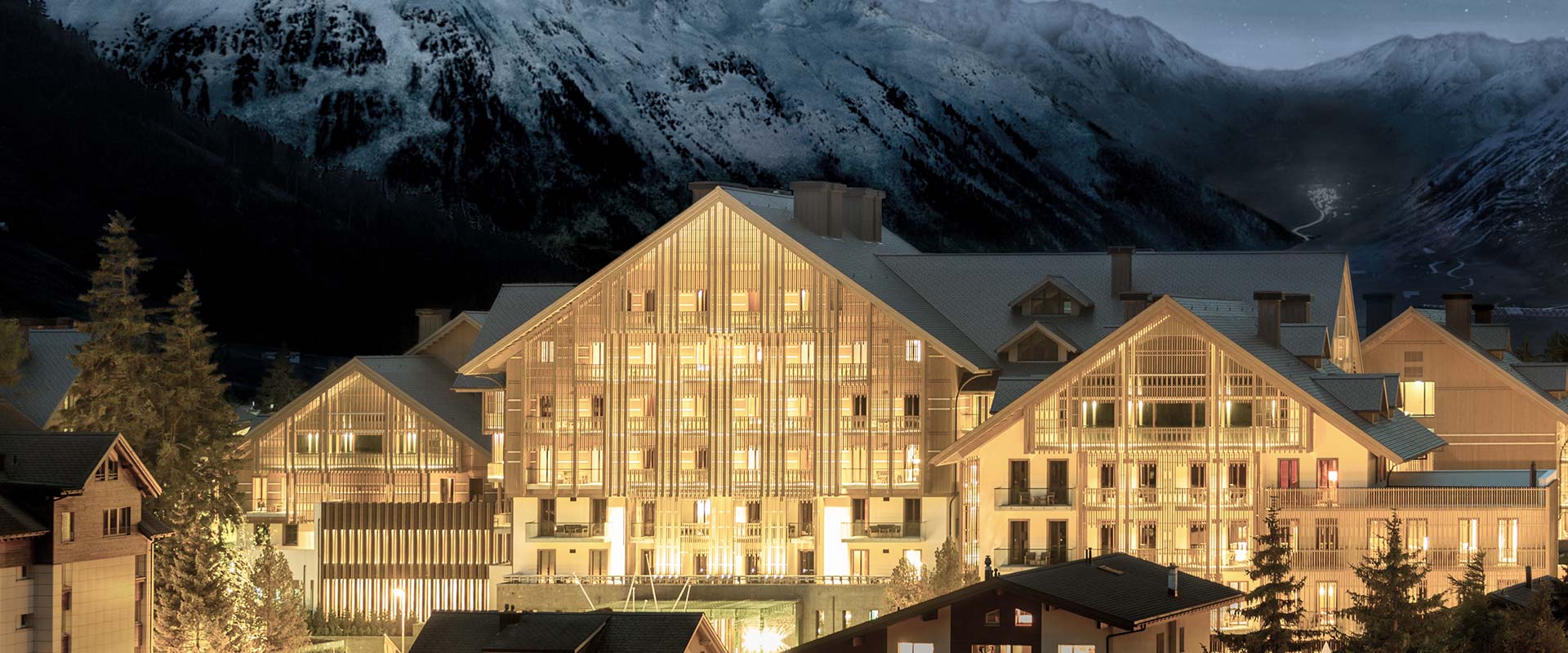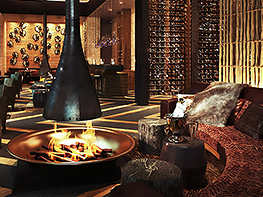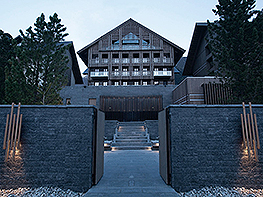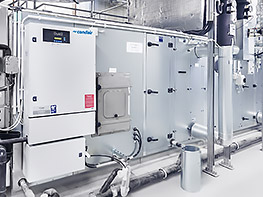
The adiabatic humidification in The Chedi 5 star hotel in Andermatt creates exactly the right climate that the guests want. 12 hybrid humidifiers were installed to meet operational requirements. The hotel owner has been well pleased with the excellent hygiene standards and the low operating costs.
After its opening in late 2013, The
Chedi in Switzerland was named
as a 2014 “must go to” destination
by the international press.
Together with other projects, it
aims to make the small town of
Andermatt more attractive than
St. Moritz. On top of that, the
Chedi exemplifies sustainability
in a luxurious way. The hotel’s
sustainable and luxurious design
is reflected in the architecture,
building materials as well as its
modern utilities.
The large hotel is surrounded
by ancient pine trees that
remained untouched by the
hotel’s construction. The building
itself was built to fit in with
the picturesque alpine town. Its
four buildings are seamlessly
built into the network of small,
cobbled streets. A facade of
native spruce pine lends these
buildings – some with up to six
floors – a dashing alpine flair.
Stately Rooms
After walking through a modern
entrance of glass and steel, one
enters reception rooms almost
six meters high. This sense of
lavishness is enforced by the sheer spaciousness of these areas as
the four buildings’ ground and first floors are all joined together.
There are always room connections and spaces that can take one
by surprise. The transition between interior and exterior has
been designed with a great attention to detail. The combination
of transparent and opaque material both accentuates and brings
together the different climate areas of inside and outside.
It is in this way that (for example) a large wood fireplace
provides the transition between the somewhat colder exterior
area and the cozy interior areas where guests can relax in and
retire to. Another two wood fireplaces provide warmth in the
cozy Aprés Ski Bar. There are 193 fireplaces in total. Every suite
– approximately a third of the total number of rooms – has its
own fireplace. Some are partially built-in fireplaces to create a
stunning sight or feature.
The gas fireplaces’ heat and flames don’t just contribute to
the guests’ feel-good factor, but are also used to provide warmth.
The hotel also uses wood chippings as a sustainable resource
for local heating. The hotel’s doors are opened in certain times
of the year with nice temperatures outside, for example in early
summer. This causes a lot of air to come into the hotel’s interior
from outside. The ventilation system’s precise settings can balance
out these fluctuations. This also means the humidity can
be continuously regulated.
Physical Wellbeing
World cuisine is celebrated in half open kitchens – the most
impressive has to be the Japanese room, minimalistic in design
and one of the hotel’s little treasures. The wall opens inwards
and is perforated with small, acutely designed openings. The
guests walk up a slightly rising walkway to enter the room for
ceremonial Japanese dining.
A cigar room with a walk in humidor and the Cheese Tower, a
glass tower used to mature cheese by mimicking the climate of
a cave, are some of the stops on a journey through the different
“culinary climate zones”. The air humidity of the hotel’s rooms
are controlled by 12 Condair Dual 2 humidifiers. A humidifier was
installed in the main restaurant’s ventilation system to provide
24,000 m³/h of air (see table for technical details). The temperature
in winter can be -15°C (5 °F) with 90 % humidity. The air is
warmed by up to 38 °C (100.4 °F) so that even after being cooled
by the humidity, its percentage is still at a comfortable 45 % and
the temperature is 21.5°C (77°F). Adiabatic humidification proves
to be the most sustainable and energy efficient humidification
method. High pressure humidifiers need much more energy for
their pressure pumps – just as steam humidifiers need more energy
to heat up the water they use. The Dual 2 installations save
on water needed in the humidification process. Excess water
lost through cleaning is minimal. The amount of water can be
precisely controlled.
Hygiene
Hygiene is always a huge concern wherever air is being saturated
with water. Legionella, mold, yeasts or any other germs cannot be
allowed to multiply. The Dual 2’s hygiene concept eliminates all
of these effectively. The main element of this hygienic concept is
silver ionization. Just as silver ions are used to sterilize drinking
water, silver ions and a sterile filter are used to permanently prevent
the reproduction of germs as
well as the build-up of biofilms.
Inorganic impurities are removed
by a fine filter, water softener
and osmosis filter. The water
quality is automatically regulated.
The internal water lines are
regularly cleaned to prevent the
build-up of germs (even during
periods where humidification is
not required). The hybrid humidifier
humidifies the air with a
combination of low pressure
atomization and evaporation.
The water droplets are completely
evaporated on ceramic elements
that are porous (like a sponge)
and therefore have a very large
surface area. This means the
humidified air does not contain
any aerosols and is essentially
free of germs. Operational hygiene
has been confirmed and
proven through lengthy tests
performed by the independent
Fresenius Institute. Hygiene
standards are reassessed after
one year’s operational use. All
of the water lines are drained
automatically once the system
is turned off. As a result of the
low pressure system, the humidification
distance is very short
and the installation is therefore
very compact.
Relationship with Nature
The materials used in the hotel’s
interior match the sustainable
humidification of the hotel. Natural
materials that boost humidity
are often used. Wood used
for construction, for example
wooden beams, remains untreated
and therefore permeable.
Wood used in flooring is oiled
and alternates with natural stone.
Belgian limestone with a bluegray
tone creates a sense of ease
and relaxation. The local granite
is laminated in various ways.
The refined lighting sparkles
like stars in a clear night’s sky.
Natural objects are even used as
decoration, be it a magic looking
tree root or tree discs. The Chedi
is a modern luxury hotel paying
many homages to nature.
Professional Article published in TAB 2015/Issue 1:: Clean air in a luxury hotel by - Andreas Maisch, Sales, Condair GmbH



